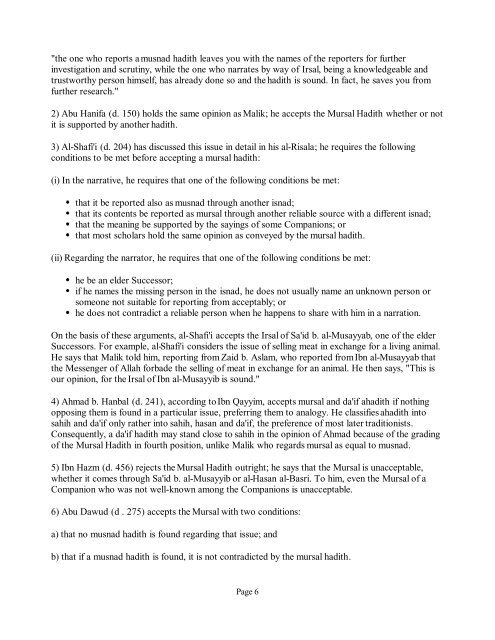Rules Governing The Criticism Of Hadith - Islam House
Rules Governing The Criticism Of Hadith - Islam House
Rules Governing The Criticism Of Hadith - Islam House
Create successful ePaper yourself
Turn your PDF publications into a flip-book with our unique Google optimized e-Paper software.
"the one who reports a musnad hadith leaves you with the names of the reporters for further<br />
investigation and scrutiny, while the one who narrates by way of Irsal, being a knowledgeable and<br />
trustworthy person himself, has already done so and the hadith is sound. In fact, he saves you from<br />
further research."<br />
2) Abu Hanifa (d. 150) holds the same opinion as Malik; he accepts the Mursal <strong>Hadith</strong> whether or not<br />
it is supported by another hadith.<br />
3) Al-Shafi'i (d. 204) has discussed this issue in detail in his al-Risala; he requires the following<br />
conditions to be met before accepting a mursal hadith:<br />
(i) In the narrative, he requires that one of the following conditions be met:<br />
that it be reported also as musnad through another isnad;<br />
that its contents be reported as mursal through another reliable source with a different isnad;<br />
that the meaning be supported by the sayings of some Companions; or<br />
that most scholars hold the same opinion as conveyed by the mursal hadith.<br />
(ii) Regarding the narrator, he requires that one of the following conditions be met:<br />
he be an elder Successor;<br />
if he names the missing person in the isnad, he does not usually name an unknown person or<br />
someone not suitable for reporting from acceptably; or<br />
he does not contradict a reliable person when he happens to share with him in a narration.<br />
On the basis of these arguments, al-Shafi'i accepts the Irsal of Sa'id b. al-Musayyab, one of the elder<br />
Successors. For example, al-Shafi'i considers the issue of selling meat in exchange for a living animal.<br />
He says that Malik told him, reporting from Zaid b. Aslam, who reported from Ibn al-Musayyab that<br />
the Messenger of Allah forbade the selling of meat in exchange for an animal. He then says, "This is<br />
our opinion, for the Irsal of Ibn al-Musayyib is sound."<br />
4) Ahmad b. Hanbal (d. 241), according to Ibn Qayyim, accepts mursal and da'if ahadith if nothing<br />
opposing them is found in a particular issue, preferring them to analogy. He classifies ahadith into<br />
sahih and da'if only rather into sahih, hasan and da'if, the preference of most later traditionists.<br />
Consequently, a da'if hadith may stand close to sahih in the opinion of Ahmad because of the grading<br />
of the Mursal <strong>Hadith</strong> in fourth position, unlike Malik who regards mursal as equal to musnad.<br />
5) Ibn Hazm (d. 456) rejects the Mursal <strong>Hadith</strong> outright; he says that the Mursal is unacceptable,<br />
whether it comes through Sa'id b. al-Musayyib or al-Hasan al-Basri. To him, even the Mursal of a<br />
Companion who was not well-known among the Companions is unacceptable.<br />
6) Abu Dawud (d . 275) accepts the Mursal with two conditions:<br />
a) that no musnad hadith is found regarding that issue; and<br />
b) that if a musnad hadith is found, it is not contradicted by the mursal hadith.<br />
Page 6

















